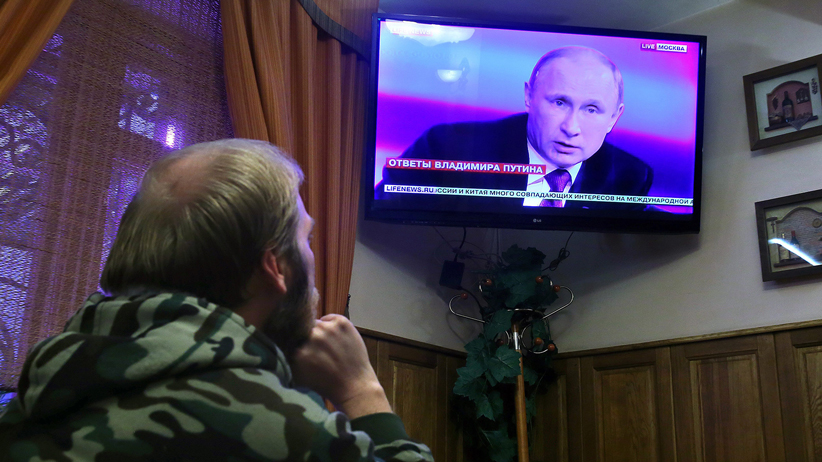Russia’s other war in Eastern Europe
Western governments are struggling with how to counter a sophisticated, entertaining and popular Kremlin-backed media
DONETSK, UKRAINE. DECEMBER 18, 2014. A man watches a TV broadcast of Russian president Vladimir Putin’s annual press conference at a cafe in Donetsk. Credit: Sharifulin Valery/TASS/CP
Share

In the early stages of Russia’s initially covert invasion of Crimea last year, a woman outside the parliament in Simferopol told a Maclean’s reporter why she thought so little of the protesters in Kyiv, the Ukrainian capital, who had forced the departure of Ukraine’s pro-Russian president, Viktor Yanukovych, days earlier.
They had been drugged, she explained of the demonstrators. Some sort of hallucinogenic had been slipped into their tea. A local man had gone to Kyiv, taken part in the protests and returned, whereupon doctors in a hospital discovered traces of the drugs in his blood, she said. Another woman in Kyiv who also opposed the street demonstrations told an almost identical story.
Both women said they learned about the drugged protesters from watching Russian-language television. They didn’t say which stations, but they were almost certainly ones controlled by or beholden to the Kremlin.
This disinformation campaign was part of what Jerzy Pomianowski, a former Polish diplomat who now heads the European Endowment for Democracy (EED), describes as Russia’s “hybrid war.” In addition to sending troops to Crimea, and later into eastern Ukraine, Russia used media propaganda to convince people in those areas that “fascists” in Kyiv threatened them and that Russia would protect them.
“In a moment of war, when a people really don’t know what to think and how to understand a situation, that makes them naturally not able to properly react when a group of 1,000 or 2,000 separatists suddenly seize control of a city. Having no alternative information, the people living there tend to agree: maybe yes, this is the solution for our situation,” he says.
Russia, says, Pomianowski, has invested a lot of time and resources into developing Russian-language media that will convey the narrative it wishes to project. Alternative voices are sometimes targeted and suppressed, but they are not always eliminated the way they might be in an outright dictatorship.
“In fact, the media that pursued editorial independence could even be useful for the Kremlin as a safety valve for the critically minded to let off steam,” writes Russia analyst Maria Lipman in an essay included in a recent report by the EED: “Bringing plurality and balance to the Russian-language media space.”
Russian speakers in Russia, Eastern Europe and the Baltic states are not forced to consume pro-Kremlin media; they choose to do so. And in many cases they make that choice because pro-Russian media content is better—more entertaining and more sophisticatedly produced—than the alternatives.
Instead of a constant barrage of hackneyed political propaganda, Kremlin-backed media offer pure entertainment, and also more subtle messaging—documentaries, for example, that portray the Soviet Union’s non-aggression pact with Nazi Germany in a positive light, that revisit historic abuses against Russians, or that obsess over the rights enjoyed by homosexuals in Western Europe.
Pro-Kremlin media have built up loyalty and credibility among their viewers. This makes it difficult for media that don’t toe the Kremlin line to make inroads. “You have no access to those audiences with just the right information instead of wrong,” says Pomianowski. “You need to take action that will recapture their trust and also provide enough attractive non-news content so they will be happy to change their choice.”
It’s a task, Pomianowski says, that Western governments are beginning to accept they should shoulder. In September, some 35 European countries, along with like-minded nations such as Korea, Japan and the United States, gathered in Warsaw to discuss options and funding for them. Canada was there but its participation was limited because of the ongoing election campaign, says Pomianowski. The EED took part in an advisory capacity.
The meeting ended with the Netherlands pledging $2.2 million and Poland $1.5 million toward new Russian-language media initiatives. Pomianowski says he expects more money will be forthcoming. The funds won’t be used to start a new television station from scratch. Rather, options include what Pomianowski describes as a “media excellence centre,” a “content factory,” that will generate content for existing outlets, and a news agency.
“We are not just creating new institutions. We are creating new forms of co-operation, and we are integrating existing partnerships. But at the same time those existing parties need to be strengthened,” he says.
Pomianowski says there are weaknesses in the content Kremlin-backed media offer. They don’t do local news well, he says, and this is an opening new Russian-language media might exploit. But winning viewers will not be easy, and Pomianowski admits: “We already realized it’s too little, too late.”
During the Cold War, citizens of the Soviet bloc distrusted their official media and took risks to access Western outlets. “Now the West’s credibility in Russia has shrivelled and, along with it, the ability of Western media to make an impact,” writes author and journalist Edward Lucas in an essay included in the EED report.
“Many Western policy-makers still seem to believe that all they need to do is crank up the old machines from the 1970s and 1980s and Russians will gratefully drink from the Western wellspring.”
The West still can sway hearts and minds in the Russian-speaking world, says Lucas. Some self-confidence would help. The European Union and NATO are both far richer and more powerful than Russia. Hardly anyone wants to move to Russia, but millions of Russians are emigrating.
“What is really lacking in Europe and North America is clarity of thought and willpower,” he writes. “We have to realize that we are again in a sharp strategic contest with the Kremlin and that we are losing.”